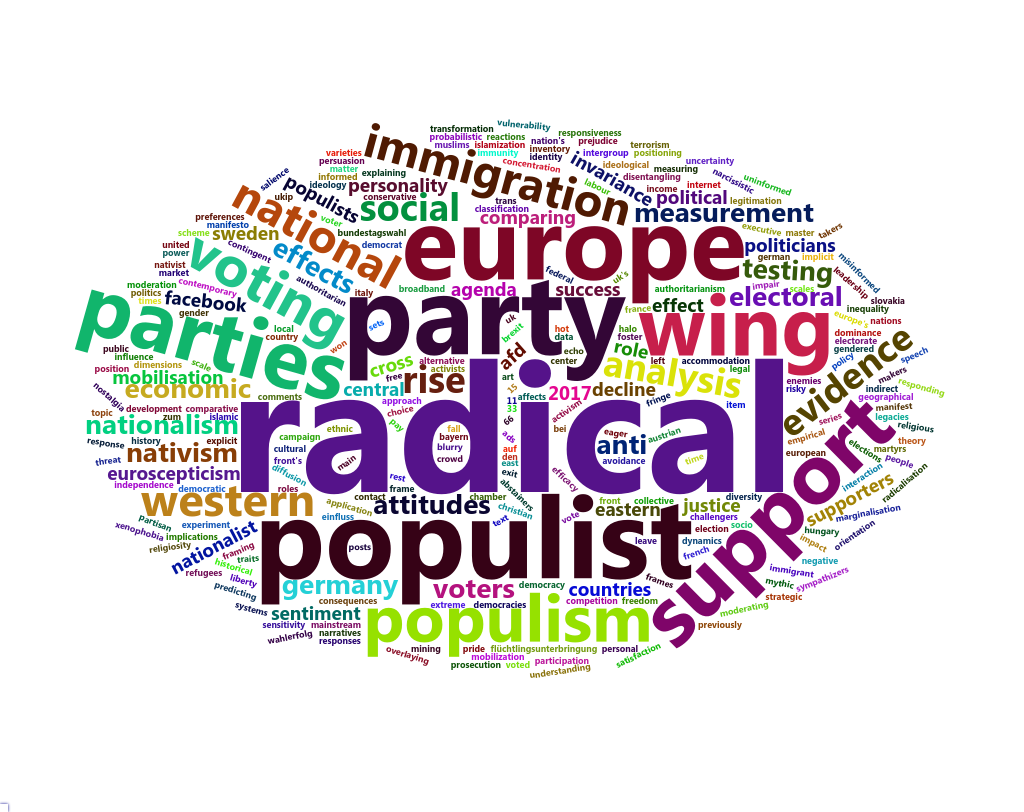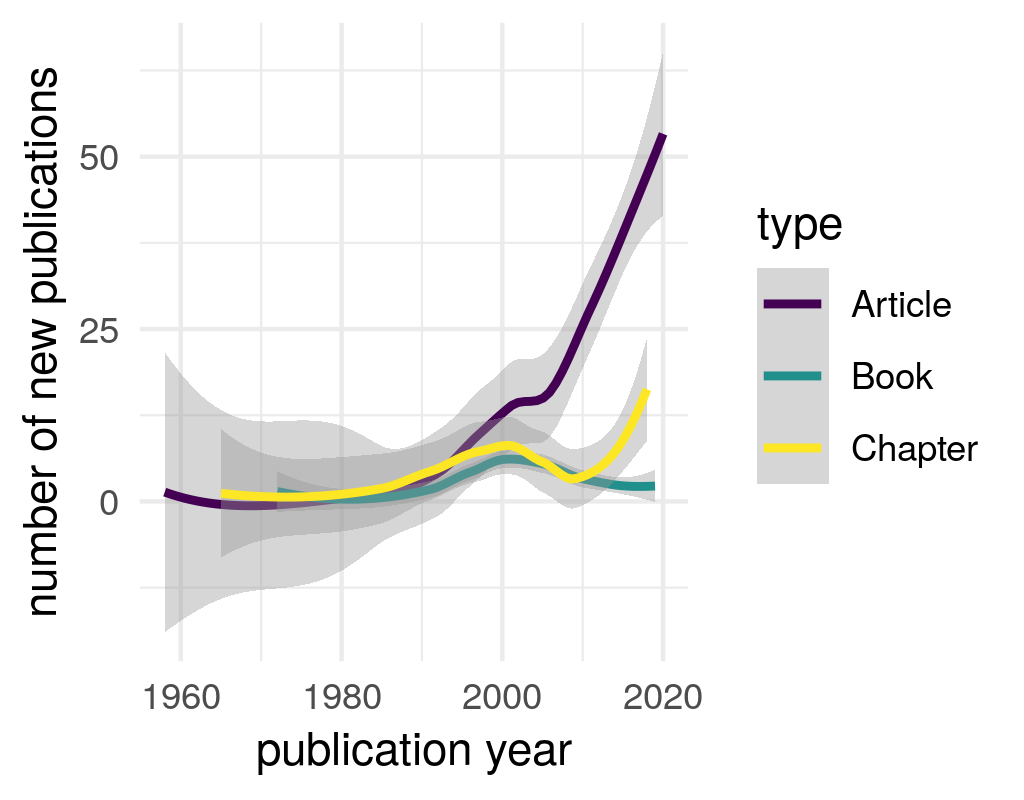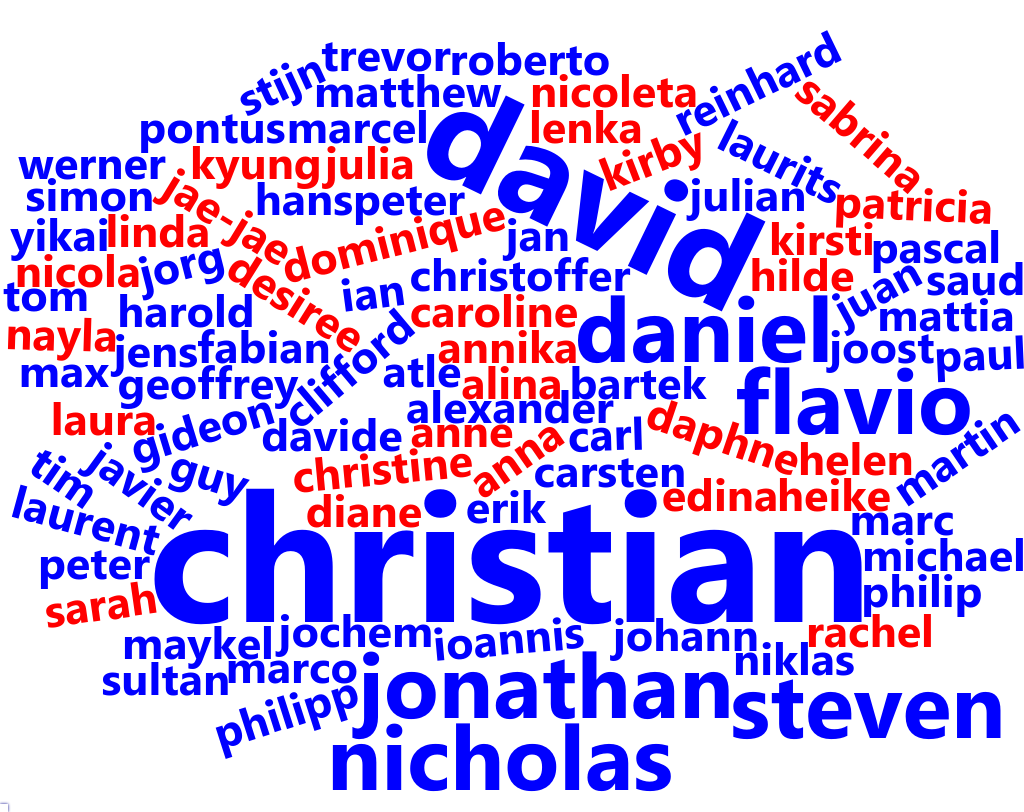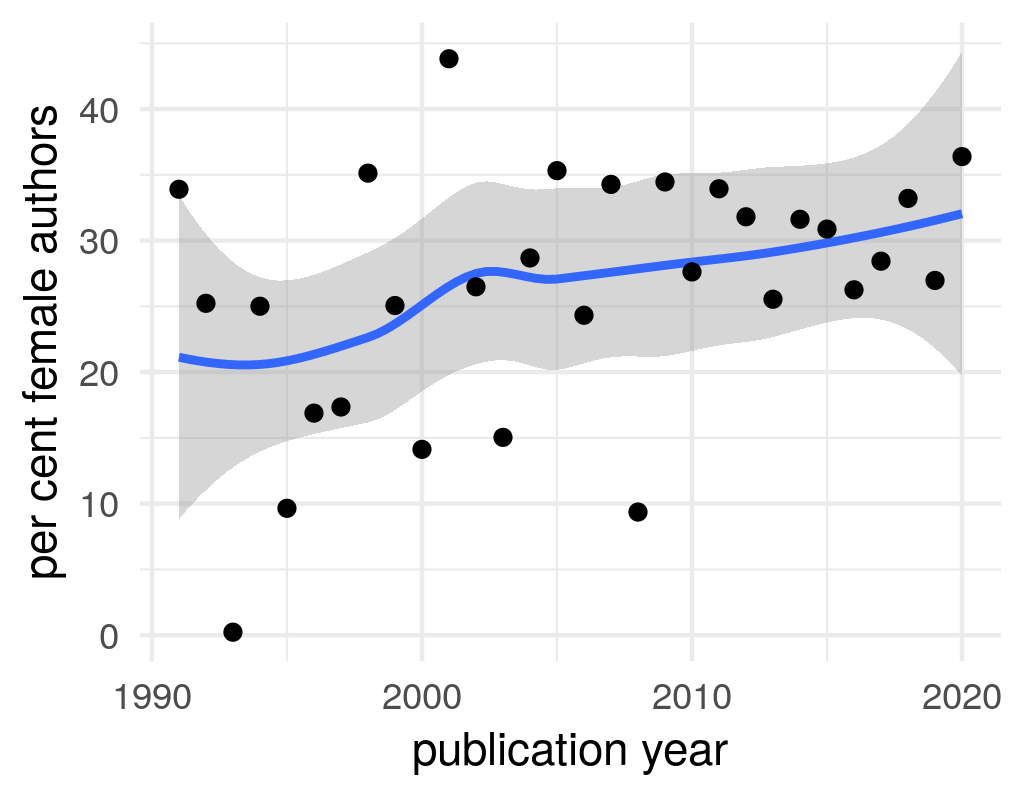What bibliography?
The Eclectic, Erratic Bibliography on the Extreme Right (in (Western) Europe)™ is a collection of references on far right parties & their voters. Most of the titles fall in to the field of Political Science (broadly defined), but some contributions from related disciplines (most notably sociology, psychology, and economy) are included, too. You a free to browse the bibliography, download it (most reference software can import this format), curse it – whatever floats your boat. If you are aware of any titles that should be in the bibliography, please send me the reference (and the PDF if you have it).
(Lazy? Just watch it)
What is new?
Since November 2019, I have added 49 new titles to the bibliography. This brings the total number of entries to 955. Most of the new titles are fairly recent and were only published in the last couple of years or so.
| Publication year | n |
|---|---|
| 2019 | 28 |
| 2020 | 17 |
| 2018 | 2 |
| 2013 | 1 |
| 2017 | 1 |
This contributes to an interesting phenomenon: almost 20 per cent of the titles in the bibliography (which has existed in one form or another for more than two decades) were published after 2017. I might get better at spotting stuff, people might be more willing to send me pointers to their work, or (this my hunch) the literature is exploding.
Almost all (48) of them are articles that were published in (peer-reviewed) journals. This is in line with the bibliography’s existing bias towards articles: since the early 2000s, articles are outpacing any other type of publication.
I’m not sure if this reflects my personal reading habits or a more general shift in publication practices. Here are the outlets in which the 48 articles were published. Again, this is broadly in line with past patterns.
| Journal | n |
|---|---|
| European Journal of Political Research | 4 |
| Party Politics | 4 |
| Political Psychology | 4 |
| West European Politics | 4 |
| Nations and Nationalism | 3 |
| Social Science Quarterly | 3 |
| Electoral Studies | 2 |
| Journal of European Public Policy | 2 |
| Politics | 2 |
| Politische Vierteljahresschrift | 2 |
| Comparative European Politics | 1 |
| Current Opinion in Behavioral Sciences | 1 |
| European Journal of Personality | 1 |
| European Political Science | 1 |
| French Politics | 1 |
| German Politics | 1 |
| Government and Opposition | 1 |
| International Journal of Public Opinion Research | 1 |
| Journal of Democracy | 1 |
| Patterns of Prejudice | 1 |
| Polish Political Science Review | 1 |
| Political Analysis | 1 |
| Political Behavior | 1 |
| Political Geography | 1 |
| Political Studies | 1 |
| Scandinavian Political Studies | 1 |
| SSRN Electronic Journal | 1 |
| The British Journal of Politics and International Relations | 1 |
What are they writing about?
I made a quick word cloud from the titles and abstracts. Click on the image for a bigger and mildly interactive version. Like in previous updates, the adjective “radical” stands out, whereas “extreme” and is mentioned only once. This neatly reflects the influence of Cas Mudde’s typology, but also the realities of West European party politics, where openly anti-democratic ideas are not popular with voters.

Populist(s) and populism are just as, well, popular. The same goes for party/parties. Some stemming would have made this more easily visible, but stems look really ugly in a word cloud (“the pie chart of text analysis” – I know). Europe, western, support, voting, immigration, and national are runners up. Pie chart or not, this makes it clear that the new entries contribute to the bibliography’s existing focus/bias (delete as appropriate) on .
Who is writing all these articles?
Last time ’round, the answer to that question was a resounding and depressing “Michael”. This time, it is an equally resounding/depressing “Christian”.
Only 29 of the 104 unique authors of the new crop are female, which amounts to 28 per cent. This has been bugging me for a long time, so I decided to have a look at the bigger picture, i.e. the 1990-2020 period that includes 97 per cent of all titles.
Because the number of authors is large, I used an algorithm that relies on US Social Security Administration baby name data to assign gender probabilities to names. This is not perfect and tends to overestimate the share of female authors, at least in a largely European context (looking at you, Andrea, Nicola, Matti, and even Reinhold (?)). I also decided to count each publication in which an author was involved in a given year as a case, i.e. I factored in the number of publications.
The share varies considerably from year to year, so I added a lowess smoother. The results suggests a very slow but appreciable upward trend. However, the data also show that there was a period in the late 1990s/early 2000s, when the share of female authors was higher than it was over the last decade or so. This resonates with Sarah de Lange’s description of a worrying development in the field. So, if you are female, please send me your work on right-wing radicalism. The men do it. All. The. Time.
Show us the goods
These are all the new titles in their full glory. Click here to download/import them into your reference manager software.
- Allen, Trevor J.. “Exit To the Right? Comparing Far Right Voters and Abstainers in Western Europe.” Electoral Studies 50 (2017): 103–115. doi:https://doi.org/10.1016/j.electstud.2017.09.012
[BibTeX]@article{allen-2017b, author = {Trevor J. Allen}, title = {Exit To the Right? Comparing Far Right Voters and Abstainers in Western Europe}, journal = {Electoral Studies}, year = {2017}, volume = {50}, pages = {103--115}, doi = {https://doi.org/10.1016/j.electstud.2017.09.012}, } - Bernhard, Laurent and Hanspeter Kriesi. “Populism in Election Times: a Comparative Analysis of 11 Countries in Western Europe.” West European Politics 42.6 (2019): 1188–1208. doi:10.1080/01402382.2019.1596694
[BibTeX]@article{bernhard-kriesi-2019, author = {Laurent Bernhard and Hanspeter Kriesi}, title = {Populism in Election Times: a Comparative Analysis of 11 Countries in Western Europe}, journal = {West European Politics}, year = {2019}, volume = {42}, number = {6}, pages = {1188--1208}, doi = {10.1080/01402382.2019.1596694}, } - Bolet, Diane. “Local Labour Market Competition and Radical Right Voting: Evidence From France.” European Journal of Political Research online first (2020). doi:10.1111/1475-6765.12378
[BibTeX]@article{bolet-2020, author = {Diane Bolet}, title = {Local Labour Market Competition and Radical Right Voting: Evidence From France}, journal = {European Journal of Political Research}, year = {2020}, volume = {online first}, doi = {10.1111/1475-6765.12378}, } - Bolin, Niklas and Nicholas Aylott. “Right-wing Populist Party Leadership in Sweden : One of a Kind Or One of the Crowd?.” Polish Political Science Review 7.1 (2019): 24–40. doi:10.2478/ppsr-2019-0002
[BibTeX]@article{bolin-aylott-2019, author = {Niklas Bolin and Nicholas Aylott}, title = {Right-wing Populist Party Leadership in Sweden : One of a Kind Or One of the Crowd?}, journal = {Polish Political Science Review}, year = {2019}, volume = {7}, number = {1}, pages = {24--40}, doi = {10.2478/ppsr-2019-0002}, } - Bos, Linda, Christian Schemer, Nicoleta Corbu, Michael Hameleers, Ioannis Andreadis, Anne Schulz, Desirée Schmuck, Carsten Reinemann, and Nayla Fawzi. “The Effects of Populism as a Social Identity Frame on Persuasion and Mobilisation: Evidence From a 15-country Experiment.” European Journal of Political Research 59.1 (2020): 3–24. doi:10.1111/1475-6765.12334
[BibTeX]@article{bos-schemer-corbu-hameleers-andreadis-schulz-schmuck-reinemann-fawzi-2020, author = {Linda Bos and Christian Schemer and Nicoleta Corbu and Michael Hameleers and Ioannis Andreadis and Anne Schulz and Desir\'{e}e Schmuck and Carsten Reinemann and Nayla Fawzi}, title = {The Effects of Populism as a Social Identity Frame on Persuasion and Mobilisation: Evidence From a 15-country Experiment}, journal = {European Journal of Political Research}, year = {2020}, volume = {59}, number = {1}, pages = {3--24}, doi = {10.1111/1475-6765.12334}, } - Bustikova, Lenka. Extreme Reactions: Radical Right Mobilization in Eastern Europe. Cambridge: Cambridge University Press, 2019.
[BibTeX]@book{bustikova-2019, author = {Lenka Bustikova}, title = {Extreme Reactions: Radical Right Mobilization in Eastern Europe}, publisher = {Cambridge University Press}, year = {2019}, address = {Cambridge}, } - Bustikova, Lenka, David S. Siroky, Saud Alashri, and Sultan Alzahrani. “Predicting Partisan Responsiveness: A Probabilistic Text Mining Time-Series Approach.” Political Analysis 28.1 (2020): 47–64. doi:10.1017/pan.2019.18
[BibTeX]@article{bustikova-siroky-alashri-alzahrani-2020, author = {Lenka Bustikova and David S. Siroky and Saud Alashri and Sultan Alzahrani}, title = {Predicting Partisan Responsiveness: A Probabilistic Text Mining Time-Series Approach}, journal = {Political Analysis}, year = {2020}, volume = {28}, number = {1}, pages = {47--64}, doi = {10.1017/pan.2019.18}, } - a’e, Hilde Coff. “Gender, gendered personality traits and radical right populist voting.” Politics 39.2 (2019): 170–185. doi:10.1177/0263395717745476
[BibTeX]@article{coffe-2019, author = {Hilde Coff{\a'e}}, title = {Gender, gendered personality traits and radical right populist voting}, journal = {Politics}, year = {2019}, volume = {39}, number = {2}, pages = {170--185}, doi = {10.1177/0263395717745476}, } - D’Alimonte, Roberto. “How the Populists Won in Italy..” Journal of Democracy 30.1 (2019): 114–127.
[BibTeX]@article{dalimonte-2019, author = {Roberto D'Alimonte}, title = {How the Populists Won in Italy.}, journal = {Journal of Democracy}, year = {2019}, volume = {30}, number = {1}, pages = {114--127}, } - Davis, Nicholas T., Kirby Goidel, Christine S. Lipsmeyer, Guy D. Whitten, and Clifford Young. “Economic Vulnerability, Cultural Decline, and Nativism: Contingent and Indirect Effects.” Social Science Quarterly 100.2 (2019): 430–446. doi:10.1111/ssqu.12591
[BibTeX]@article{davis-goidel-lipsmeyer-whitten-young-2019, author = {Nicholas T. Davis and Kirby Goidel and Christine S. Lipsmeyer and Guy D. Whitten and Clifford Young}, title = {Economic Vulnerability, Cultural Decline, and Nativism: Contingent and Indirect Effects}, journal = {Social Science Quarterly}, year = {2019}, volume = {100}, number = {2}, pages = {430--446}, doi = {10.1111/ssqu.12591}, } - Davis, Nicholas T., Kirby Goidel, Christine S. Lipsmeyer, Guy D. Whitten, and Clifford Young. “The Political Consequences of Nativism: The Impact of Nativist Sentiment on Party Support*.” Social Science Quarterly 100.2 (2019): 466–479. doi:10.1111/ssqu.12596
[BibTeX]@article{davis-goidel-lipsmeyer-whitten-young-2019b, author = {Nicholas T. Davis and Kirby Goidel and Christine S. Lipsmeyer and Guy D. Whitten and Clifford Young}, title = {The Political Consequences of Nativism: The Impact of Nativist Sentiment on Party Support*}, journal = {Social Science Quarterly}, year = {2019}, volume = {100}, number = {2}, pages = {466--479}, doi = {10.1111/ssqu.12596}, } - Down, Ian and Kyung Joon Han. “Marginalisation Or Legitimation? Mainstream Party Positioning on Immigration and Support for Radical Right Parties.” West European Politics (2019): online first. doi:10.1080/01402382.2019.1674055
[BibTeX]@article{down-han-2019, author = {Ian Down and Kyung Joon Han}, title = {Marginalisation Or Legitimation? Mainstream Party Positioning on Immigration and Support for Radical Right Parties}, journal = {West European Politics}, year = {2019}, pages = {online first}, doi = {10.1080/01402382.2019.1674055}, } - Engler, Sarah and David Weisstanner. “The Threat of Social Decline: Income Inequality and Radical Right Support.” Journal of European Public Policy online first (2020). doi:10.1080/13501763.2020.1733636
[BibTeX]@article{engler-weisstanner-2020, author = {Sarah Engler and David Weisstanner}, title = {The Threat of Social Decline: Income Inequality and Radical Right Support}, journal = {Journal of European Public Policy}, year = {2020}, volume = {online first}, doi = {10.1080/13501763.2020.1733636}, } - Evans, Geoffrey and Jonathan Mellon. “Immigration, Euroscepticism, and the rise and fall of UKIP.” Party Politics 25.1 (2019): 76–87. doi:10.1177/1354068818816969
[BibTeX]@article{evans-mellon-2019, author = {Geoffrey Evans and Jonathan Mellon}, title = {Immigration, Euroscepticism, and the rise and fall of UKIP}, journal = {Party Politics}, year = {2019}, volume = {25}, number = {1}, pages = {76--87}, doi = {10.1177/1354068818816969}, } - Green-Pedersen, Christoffer and Simon Otjes. “A hot topic? Immigration on the agenda in Western Europe.” Party Politics 25.3 (2019): 424–434. doi:10.1177/1354068817728211
[BibTeX]@article{green-pedersen-otjes-2019, author = {Christoffer Green-Pedersen and Simon Otjes}, title = {A hot topic? Immigration on the agenda in Western Europe}, journal = {Party Politics}, year = {2019}, volume = {25}, number = {3}, pages = {424--434}, doi = {10.1177/1354068817728211}, } - Gründl, Johann and Julian Aichholzer. “Support for the Populist Radical Right: Between Uncertainty Avoidance and Risky Choice.” Political Psychology online first (2020). doi:10.1111/pops.12643
[BibTeX]@article{gruendl-aichholzer-2020, author = {Johann Gr{\"u}ndl and Julian Aichholzer}, title = {Support for the Populist Radical Right: Between Uncertainty Avoidance and Risky Choice}, journal = {Political Psychology}, year = {2020}, volume = {online first}, doi = {10.1111/pops.12643}, } - Halikiopoulou, Daphne and Tim Vlandas. “What Is New and What Is Nationalist About Europe’s New Nationalism? Explaining the Rise of the Far Right in Europe.” Nations and Nationalism 25.2 (2019): 409–434. doi:10.1111/nana.12515
[BibTeX]@article{halikiopoulou-vlandas-2019, author = {Daphne Halikiopoulou and Tim Vlandas}, title = {What Is New and What Is Nationalist About Europe's New Nationalism? Explaining the Rise of the Far Right in Europe}, journal = {Nations and Nationalism}, year = {2019}, volume = {25}, number = {2}, pages = {409--434}, doi = {10.1111/nana.12515}, } - Haugsgjerd, Atle. “Moderation or radicalisation? How executive power affects right-wing populists’ satisfaction with democracy.” Electoral Studies 57 (2019): 31–45. doi:10.1016/j.electstud.2018.09.008
[BibTeX]@article{haugsgjerd-2019, author = {Atle Haugsgjerd}, title = {Moderation or radicalisation? How executive power affects right-wing populists' satisfaction with democracy}, journal = {Electoral Studies}, year = {2019}, volume = {57}, pages = {31--45}, doi = {10.1016/j.electstud.2018.09.008}, } - Hauwaert, Steven Van M.. “On Far Right Parties, Master Frames and Trans-National Diffusion: Understanding Far Right Party Development in Western Europe.” Comparative European Politics (2018): online first. doi:10.1057/s41295-017-0112-z
[BibTeX]@article{hauwaert-2018b, author = {Steven M. Van Hauwaert}, title = {On Far Right Parties, Master Frames and Trans-National Diffusion: Understanding Far Right Party Development in Western Europe}, journal = {Comparative European Politics}, year = {2018}, pages = {online first}, doi = {10.1057/s41295-017-0112-z}, } - Hauwaert, Steven Van M., Christian H. Schimpf, and Flavio Azevedo. “The Measurement of Populist Attitudes: Testing Cross-national Scales Using Item Response Theory.” Politics 40.1 (2020): 3–21. doi:10.1177/0263395719859306
[BibTeX]@article{hauwaert-schimpf-azevedo-2020, author = {Steven M. Van Hauwaert and Christian H. Schimpf and Flavio Azevedo}, title = {The Measurement of Populist Attitudes: Testing Cross-national Scales Using Item Response Theory}, journal = {Politics}, year = {2020}, volume = {40}, number = {1}, pages = {3--21}, doi = {10.1177/0263395719859306}, } - Heinisch, Reinhard, Steven Saxonberg, Annika Werner, and Fabian Habersack. “The effect of radical right fringe parties on main parties in Central and Eastern Europe: Empirical evidence from manifesto data.” Party Politics (2019): online first. doi:10.1177/1354068819863620
[BibTeX]@article{heinisch-saxonberg-werner-habersack-2019, author = {Reinhard Heinisch and Steven Saxonberg and Annika Werner and Fabian Habersack}, title = {The effect of radical right fringe parties on main parties in Central and Eastern Europe: Empirical evidence from manifesto data}, journal = {Party Politics}, year = {2019}, pages = {online first}, doi = {10.1177/1354068819863620}, } - Hutchins, Rachel D. and Daphne Halikiopoulou. “Enemies of Liberty? Nationalism, Immigration, and the Framing of Terrorism in the Agenda of the Front National.” Nations and Nationalism 26.1 (2020): 67–84. doi:10.1111/nana.12555
[BibTeX]@article{hutchins-halikiopoulou-2020, author = {Rachel D. Hutchins and Daphne Halikiopoulou}, title = {Enemies of Liberty? Nationalism, Immigration, and the Framing of Terrorism in the Agenda of the Front National}, journal = {Nations and Nationalism}, year = {2020}, volume = {26}, number = {1}, pages = {67--84}, doi = {10.1111/nana.12555}, } - Jacobs, Laura and Joost van Spanje. “Martyrs for Free Speech? Disentangling the Effects of Legal Prosecution of Anti-immigration Politicians on their Electoral Support.” Political Behavior (2019). doi:10.1007/s11109-019-09581-6
[BibTeX]@article{jacobs-spanje-2019, author = {Laura Jacobs and Joost {van Spanje}}, title = {Martyrs for Free Speech? Disentangling the Effects of Legal Prosecution of Anti-immigration Politicians on their Electoral Support}, journal = {Political Behavior}, year = {2019}, doi = {10.1007/s11109-019-09581-6}, } - Jylhä, Kirsti M., Jens Rydgren, and Pontus Strimling. “Radical Right-wing Voters From Right and Left: Comparing Sweden Democrat Voters Who Previously Voted for the Conservative Party Or the Social Democratic Party.” Scandinavian Political Studies 42.3-4 (2019): 220–244. doi:10.1111/1467-9477.12147
[BibTeX]@article{jylhae-rydgren-strimling-2019, author = {Kirsti M. Jylh{\"a} and Jens Rydgren and Pontus Strimling}, title = {Radical Right-wing Voters From Right and Left: Comparing Sweden Democrat Voters Who Previously Voted for the Conservative Party Or the Social Democratic Party}, journal = {Scandinavian Political Studies}, year = {2019}, volume = {42}, number = {3-4}, pages = {220--244}, doi = {10.1111/1467-9477.12147}, } - Kende, Anna and P{a’e}ter Krek a’o. “Xenophobia, Prejudice, and Right-wing Populism in East-central Europe.” Current Opinion in Behavioral Sciences 34 (2020): 29–33. doi:https://doi.org/10.1016/j.cobeha.2019.11.011
[BibTeX]@article{kende-kreko-2020, author = {Anna Kende and P{\a'e}ter Krek{\a'o}}, title = {Xenophobia, Prejudice, and Right-wing Populism in East-central Europe}, journal = {Current Opinion in Behavioral Sciences}, year = {2020}, volume = {34}, pages = {29--33}, doi = {https://doi.org/10.1016/j.cobeha.2019.11.011}, } - van Kessel, Stijn, Nicola Chelotti, Helen Drake, Juan Roch, and Patricia Rodi. “Eager To Leave? Populist Radical Right Parties’ Responses To the UK’s Brexit Vote.” The British Journal of Politics and International Relations 22.1 (2020): 65–84. doi:10.1177/1369148119886213
[BibTeX]@article{kessel-chelotti-drake-roch-rodi-2020, author = {Stijn {van Kessel} and Nicola Chelotti and Helen Drake and Juan Roch and Patricia Rodi}, title = {Eager To Leave? Populist Radical Right Parties’ Responses To the UK's Brexit Vote}, journal = {The British Journal of Politics and International Relations}, year = {2020}, volume = {22}, number = {1}, pages = {65--84}, doi = {10.1177/1369148119886213}, } - Lancaster, Caroline Marie. “Not So Radical After All: Ideological Diversity Among Radical Right Supporters and Its Implications.” Political Studies (2019): online first. doi:10.1177/0032321719870468
[BibTeX]@article{lancaster-2019, author = {Caroline Marie Lancaster}, title = {Not So Radical After All: Ideological Diversity Among Radical Right Supporters and Its Implications}, journal = {Political Studies}, year = {2019}, pages = {online first}, doi = {10.1177/0032321719870468}, } - Lubbers, Marcel. “What kind of nationalism sets the radical right and its electorate apart from the rest? Pride in the nation’s history as part of nationalist nostalgia.” Nations and Nationalism 25.2 (2019): 449–466. doi:10.1111/nana.12517
[BibTeX]@article{lubbers-2019, author = {Marcel Lubbers}, title = {What kind of nationalism sets the radical right and its electorate apart from the rest? Pride in the nation's history as part of nationalist nostalgia}, journal = {Nations and Nationalism}, year = {2019}, volume = {25}, number = {2}, pages = {449--466}, doi = {10.1111/nana.12517}, } - Martin, Christian W.. “Electoral Participation and Right Wing Authoritarian Success – Evidence from the 2017 Federal Elections in Germany.” Politische Vierteljahresschrift 60.2 (2019): 245–271.
[BibTeX]@article{martin-2019, author = {Christian W. Martin}, title = {Electoral Participation and Right Wing Authoritarian Success -- Evidence from the 2017 Federal Elections in Germany}, journal = {Politische Vierteljahresschrift}, year = {2019}, volume = {60}, number = {2}, pages = {245--271}, } - Mayer, Sabrina J., Carl C. Berning, and David Johann. “The Two Dimensions of Narcissistic Personality and Support for the Radical Right: The Role of Right-wing Authoritarianism, Social Dominance Orientation and Anti-immigrant Sentiment.” European Journal of Personality (2020): online first. doi:10.1002/per.2228
[BibTeX]@article{mayer-berning-johann-2020, author = {Sabrina J. Mayer and Carl C. Berning and David Johann}, title = {The Two Dimensions of Narcissistic Personality and Support for the Radical Right: The Role of Right-wing Authoritarianism, Social Dominance Orientation and Anti-immigrant Sentiment}, journal = {European Journal of Personality}, year = {2020}, pages = {online first}, doi = {10.1002/per.2228}, } - Nijs, Tom, Tobias H. Stark, and Maykel Verkuyten. “Negative Intergroup Contact and Radical Right-Wing Voting: The Moderating Roles of Personal and Collective Self-Efficacy.” Political Psychology 40.5 (2019): 1057–1073. doi:10.1111/pops.12577
[BibTeX]@article{nijs-stark-verkuyten-2019, author = {Tom Nijs and Tobias H. Stark and Maykel Verkuyten}, title = {Negative Intergroup Contact and Radical Right-Wing Voting: The Moderating Roles of Personal and Collective Self-Efficacy}, journal = {Political Psychology}, year = {2019}, volume = {40}, number = {5}, pages = {1057--1073}, doi = {10.1111/pops.12577}, } - Pytlas, Bartek. “Radical-right Narratives in Slovakia and Hungary: Historical Legacies, Mythic Overlaying and Contemporary Politics.” Patterns of Prejudice 47.2 (2013): 162–183. doi:10.1080/0031322X.2013.786199
[BibTeX]@article{pytlas-2013, author = {Bartek Pytlas}, title = {Radical-right Narratives in Slovakia and Hungary: Historical Legacies, Mythic Overlaying and Contemporary Politics}, journal = {Patterns of Prejudice}, year = {2013}, volume = {47}, number = {2}, pages = {162--183}, doi = {10.1080/0031322X.2013.786199}, } - Rathgeb, Philip. “Makers Against Takers: the Socio-economic Ideology and Policy of the Austrian Freedom Party.” West European Politics online first (2020). doi:10.1080/01402382.2020.1720400
[BibTeX]@article{rathgeb-2020, author = {Philip Rathgeb}, title = {Makers Against Takers: the Socio-economic Ideology and Policy of the Austrian Freedom Party}, journal = {West European Politics}, year = {2020}, volume = {online first}, doi = {10.1080/01402382.2020.1720400}, } - Rothmund, Tobias, Laurits Bromme, and Fl a’a. “Justice for the People? How Justice Sensitivity Can Foster and Impair Support for Populist Radical-Right Parties and Politicians in the United States and in Germany.” Political Psychology (2020): online first. doi:10.1111/pops.12632
[BibTeX]@article{rothmund-bromme-azevedo-2020, author = {Tobias Rothmund and Laurits Bromme and Fl{\a'a}vio Azevedo}, title = {Justice for the People? How Justice Sensitivity Can Foster and Impair Support for Populist Radical-Right Parties and Politicians in the United States and in Germany}, journal = {Political Psychology}, year = {2020}, pages = {online first}, doi = {10.1111/pops.12632}, } - Rovny, Jan and Jonathan Polk. “Still Blurry? Economic Salience, Position and Voting for Radical Right Parties in Western Europe.” European Journal of Political Research (2019): online first. doi:10.1111/1475-6765.12356
[BibTeX]@article{rovny-polk-2019, author = {Jan Rovny and Jonathan Polk}, title = {Still Blurry? Economic Salience, Position and Voting for Radical Right Parties in Western Europe}, journal = {European Journal of Political Research}, year = {2019}, pages = {online first}, doi = {10.1111/1475-6765.12356}, } - Schaub, Max and Davide Morisi. “Voter Mobilisation in the Echo Chamber: Broadband Internet and the Rise of Populism in Europe.” European Journal of Political Research online first (2020). doi:10.1111/1475-6765.12373
[BibTeX]@article{schaub-morisi-2020, author = {Max Schaub and Davide Morisi}, title = {Voter Mobilisation in the Echo Chamber: Broadband Internet and the Rise of Populism in Europe}, journal = {European Journal of Political Research}, year = {2020}, volume = {online first}, doi = {10.1111/1475-6765.12373}, } - Schmuck, Desirée and Jörg Matthes. “Voting “Against Islamization”? How Anti-Islamic Right-Wing, Populist Political Campaign Ads Influence Explicit and Implicit Attitudes Toward Muslims as Well as Voting Preferences.” Political Psychology 40.4 (2019): 739–757. doi:10.1111/pops.12557
[BibTeX]@article{schmuck-matthes-2019, author = {Desir\'{e}e Schmuck and J{\"o}rg Matthes}, title = {Voting {"}Against Islamization{"}? How Anti-Islamic Right-Wing, Populist Political Campaign Ads Influence Explicit and Implicit Attitudes Toward Muslims as Well as Voting Preferences}, journal = {Political Psychology}, year = {2019}, volume = {40}, number = {4}, pages = {739--757}, doi = {10.1111/pops.12557}, } - Schulte-Cloos, Julia and Tobias Rüttenauer. “A Transformation From Within? Dynamics of Party Activists and the Rise of the German Afd.” SSRN Electronic Journal (2018). doi:10.2139/ssrn.3306183
[BibTeX]@article{schulte-cloos-ruettenauer-2018, author = {Julia Schulte-Cloos and Tobias R{\"u}ttenauer}, title = {A Transformation From Within? Dynamics of Party Activists and the Rise of the German Afd}, journal = {SSRN Electronic Journal}, year = {2018}, doi = {10.2139/ssrn.3306183}, } - Siegers, Pascal and Alexander Jedinger. “Religious Immunity To Populism: Christian Religiosity and Public Support for the Alternative for Germany.” German Politics (2020): online first. doi:10.1080/09644008.2020.1723002
[BibTeX]@article{siegers-jedinger-2020, author = {Pascal Siegers and Alexander Jedinger}, title = {Religious Immunity To Populism: Christian Religiosity and Public Support for the Alternative for Germany}, journal = {German Politics}, year = {2020}, pages = {online first}, doi = {10.1080/09644008.2020.1723002}, } - Spoon, Jae-Jae and Heike Klüver. “Responding To Far Right Challengers: Does Accommodation Pay Off?.” Journal of European Public Policy 27.2 (2020): 273–291. doi:10.1080/13501763.2019.1701530
[BibTeX]@article{spoon-kluever-2020, author = {Jae-Jae Spoon and Heike Kl{\"u}ver}, title = {Responding To Far Right Challengers: Does Accommodation Pay Off?}, journal = {Journal of European Public Policy}, year = {2020}, volume = {27}, number = {2}, pages = {273--291}, doi = {10.1080/13501763.2019.1701530}, } - Stecker, Christian and Marc Debus. “Refugees Welcome? Zum Einfluss der Flüchtlingsunterbringung auf den Wahlerfolg der AfD bei der Bundestagswahl 2017 in Bayern.” Politische Vierteljahresschrift 60.2 (2019): 299–323. doi:10.1007/s11615-019-00151-3
[BibTeX]@article{stecker-debus-2019, author = {Christian Stecker and Marc Debus}, title = {Refugees Welcome? Zum Einfluss der Flüchtlingsunterbringung auf den Wahlerfolg der AfD bei der Bundestagswahl 2017 in Bayern}, journal = {Politische Vierteljahresschrift}, year = {2019}, volume = {60}, number = {2}, pages = {299--323}, doi = {10.1007/s11615-019-00151-3}, } - Stockemer, Daniel. “What Is Right-Wing Populism and How Does It Manifest Itself? an Analysis of the French National Front’s Facebook Posts and Sympathizers’ Facebook Comments.” French Politics 17.3 (2019): 340–354. doi:10.1057/s41253-019-00082-w
[BibTeX]@article{stockemer-2019, author = {Daniel Stockemer}, title = {What Is Right-Wing Populism and How Does It Manifest Itself? an Analysis of the French National Front's Facebook Posts and Sympathizers' Facebook Comments}, journal = {French Politics}, year = {2019}, volume = {17}, number = {3}, pages = {340--354}, doi = {10.1057/s41253-019-00082-w}, } - Szöcsik, Edina and Alina Polyakova. “Euroscepticism and the Electoral Success of the Far Right: the Role of the Strategic Interaction Between Center and Far Right.” European Political Science 18.3 (2019): 400–420. doi:10.1057/s41304-018-0162-y
[BibTeX]@article{szoecsik-polyakova-2019, author = {Edina Sz{\"o}csik and Alina Polyakova}, title = {Euroscepticism and the Electoral Success of the Far Right: the Role of the Strategic Interaction Between Center and Far Right}, journal = {European Political Science}, year = {2019}, volume = {18}, number = {3}, pages = {400--420}, doi = {10.1057/s41304-018-0162-y}, } - Wettstein, Martin, Anne Schulz, Marco Steenbergen, Christian Schemer, Philipp Müller, Dominique S. Wirz, and Werner Wirth. “Measuring Populism Across Nations: Testing for Measurement Invariance of an Inventory of Populist Attitudes.” International Journal of Public Opinion Research (2019). doi:10.1093/ijpor/edz018
[BibTeX]@article{wettstein-schulz-steenbergen-schemer-mueller-wirz-wirth-2019, author = {Martin Wettstein and Anne Schulz and Marco Steenbergen and Christian Schemer and Philipp M{\"u}ller and Dominique S. Wirz and Werner Wirth}, title = {Measuring Populism Across Nations: Testing for Measurement Invariance of an Inventory of Populist Attitudes}, journal = {International Journal of Public Opinion Research}, year = {2019}, doi = {10.1093/ijpor/edz018}, } - Whiteley, Paul, Erik Larsen, Matthew Goodwin, and Harold Clarke. “Party Activism in the Populist Radical Right: the Case of the Uk Independence Party.” Party Politics online first (2019). doi:10.1177/1354068819880142
[BibTeX]@article{whiteley-larsen-goodwin-clarke-2019, author = {Paul Whiteley and Erik Larsen and Matthew Goodwin and Harold Clarke}, title = {Party Activism in the Populist Radical Right: the Case of the Uk Independence Party}, journal = {Party Politics}, year = {2019}, volume = {online first}, doi = {10.1177/1354068819880142}, } - van Wijk, Daniël, Gideon Bolt, and Jochem Tolsma. “Where does ethnic concentration matter for populist radical right support? An analysis of geographical scale and the halo effect.” Political Geography 77 (2020): online first. doi:https://doi.org/10.1016/j.polgeo.2019.102097
[BibTeX]@article{wijk-bolt-tolsma-2020, author = {Dani{\"e}l {van Wijk} and Gideon Bolt and Jochem Tolsma}, title = {Where does ethnic concentration matter for populist radical right support? An analysis of geographical scale and the halo effect}, journal = {Political Geography}, year = {2020}, volume = {77}, pages = {online first}, doi = {https://doi.org/10.1016/j.polgeo.2019.102097}, } - Zulianello, Mattia. “Varieties of Populist Parties and Party Systems in Europe: From State-of-the-Art to the Application of a Novel Classification Scheme to 66 Parties in 33 Countries.” Government and Opposition (2019): 1–21. doi:10.1017/gov.2019.21
[BibTeX]@article{zulianello-2019b, author = {Mattia Zulianello}, title = {Varieties of Populist Parties and Party Systems in Europe: From State-of-the-Art to the Application of a Novel Classification Scheme to 66 Parties in 33 Countries}, journal = {Government and Opposition}, year = {2019}, pages = {1--21}, doi = {10.1017/gov.2019.21}, publisher = {Cambridge University Press}, } - Zhao, Yikai. “Testing the Measurement Invariance of Nativism.” Social Science Quarterly 100.2 (2019): 419–429. doi:10.1111/ssqu.12594
[BibTeX]@article{zhao-2019, author = {Yikai Zhao}, title = {Testing the Measurement Invariance of Nativism}, journal = {Social Science Quarterly}, year = {2019}, volume = {100}, number = {2}, pages = {419--429}, doi = {10.1111/ssqu.12594}, } - van Kessel, Stijn, Javier Sajuria, and Steven Van M. Hauwaert. “Informed, Uninformed Or Misinformed? A Cross-national Analysis of Populist Party Supporters Across European Democracies.” West European Politics online first (2020). doi:10.1080/01402382.2019.1700448
[BibTeX]@article{kessel-sajuria-hauwaert-2020, author = {Stijn {van Kessel} and Javier Sajuria and Steven M. Van Hauwaert}, title = {Informed, Uninformed Or Misinformed? A Cross-national Analysis of Populist Party Supporters Across European Democracies}, journal = {West European Politics}, year = {2020}, volume = {online first}, doi = {10.1080/01402382.2019.1700448}, }
Discover more from kai arzheimer
Subscribe to get the latest posts sent to your email.





RT @kai_arzheimer: The Far Right Bibliography: the pandemic (aka spring 2020) update https://t.co/N2tOnxnMVU Contains research from @LBusti…
RT @kai_arzheimer: The Far Right Bibliography: the pandemic (aka spring 2020) update https://t.co/N2tOnxnMVU Contains research from @LBusti…
RT @kai_arzheimer: What’s the latest in research on the Radical Right? ? ?
? Full write-up https://t.co/N2tOnxnMVU https://t.co/kvwl1dlKn9
RT @kai_arzheimer: What’s the latest in research on the Radical Right? ? ?
? Full write-up https://t.co/N2tOnxnMVU https://t.co/kvwl1dlKn9
RT @kai_arzheimer: What’s the latest in research on the Radical Right? ? ?
? Full write-up https://t.co/N2tOnxnMVU https://t.co/kvwl1dlKn9
RT @RRResRobot: Unilaterally decided to tweet only about the new entries for a while #RiseoftheMachines https://t.co/Gi3q522HbX https://t.c…
RT @kai_arzheimer: I have updated the bibliography on #RadicalRight parties & their voters. There are 49 new titles, the total is now 955.…
RT @kai_arzheimer: I have updated the bibliography on #RadicalRight parties & their voters. There are 49 new titles, the total is now 955.…
The Far Right Bibliography: the pandemic (aka spring 2020) update – kai arzheimer https://t.co/9sfLGDetYS
RT @kai_arzheimer: I have updated the bibliography on #RadicalRight parties & their voters. There are 49 new titles, the total is now 955.…
RT @kai_arzheimer: I have updated the bibliography on #RadicalRight parties & their voters. There are 49 new titles, the total is now 955.…
RT @kai_arzheimer: I have updated the bibliography on #RadicalRight parties & their voters. There are 49 new titles, the total is now 955.…
RT @kai_arzheimer: I have updated the bibliography on #RadicalRight parties & their voters. There are 49 new titles, the total is now 955.…
RT @kai_arzheimer: I have updated the bibliography on #RadicalRight parties & their voters. There are 49 new titles, the total is now 955.…
RT @kai_arzheimer: I have updated the bibliography on #RadicalRight parties & their voters. There are 49 new titles, the total is now 955.…
RT @RRResRobot: Master gave me some new things to play with https://t.co/Gi3q52ki3v